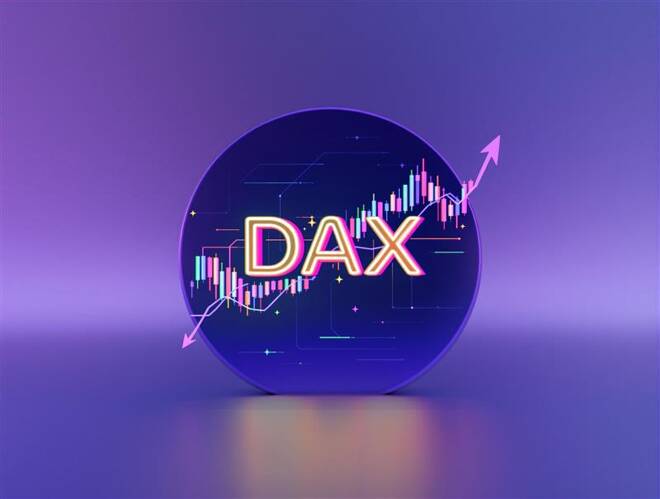Advertisement
Advertisement
Dax Index News: Forecasts Turn Bullish on US-Tariff U-Turn Ahead of US CPI Data
By:
Key Points:
- DAX surges as Trump cuts EU tariffs to 10% for 90 days, easing recession fears and boosting German market sentiment.
- Deutsche Bank and Commerzbank lead gains amid hopes of a US-EU trade truce and reduced odds of a US recession in 2025.
- US CPI data in focus as markets assess inflation trends and the likelihood of a Fed rate cut in H1 2025.
DAX Rallies on Tariff Optimism
The DAX opened sharply higher on Thursday, April 10, soaring 7.87% to 21,218. Investors reacted to President Trump unexpectedly announcing lower tariffs on EU goods, down from 20% to 10% for 90 days, boosting demand for German-listed stocks.
Trump also lowered tariffs on other non-retaliating countries to 10%, easing recession fears. According to Kalshi, the odds of a 2025 US recession dropped from 69.3% on April 9 to 56% on April 10.
Sector Performance: Tech and Banks Lead the Charge
Trump’s tariff pivot lifted broader market sentiment. Tech stocks led the charge, with Infineon Technologies soaring 14.97%, while SAP jumped 9.35%.
Banks also rallied on easing recession fears, with Deutsche Bank and Commerzbank rising 13.09% and 7.48%, respectively.
Auto stocks benefited from easing tariffs and hopes of a US-EU trade deal. Daimler Truck Holding led the gains, advancing 11.29%. BMW, Mercedes-Benz Group, Porsche, and Volkswagen also rallied at the open.
On April 9, CN Wire reported that the EU trade chief discussed parameters to lower tariffs with the US, boosting demand for export-linked stocks.
US Markets Soar on Trump’s Tariff U-Turn
US equity markets surged on Wednesday, April 9, driven by President Trump’s tariff announcements. The Nasdaq Composite Index soared 12.16%, while the Dow and the S&P 500 rallied 7.87% and 9.52%, respectively.
US CPI Report in Focus
Amid shifting sentiment toward US tariffs, market focus will now turn to the US CPI Report on Thursday, April 10. Economists forecast the annual inflation rate to ease from 2.8% in February to 2.6% in March.
A softer print could reinforce expectations of an H1 2025 Fed rate cut, boosting demand for risk assets. Conversely, a higher inflation reading could prompt the Fed to delay rate cuts. A more hawkish Fed stance may weigh on rate-sensitive stocks amid ongoing tariff concerns.
Peter Berezin, Chief Global Strategist and Director of Research at BCA Research, commented on potential inflationary pressures:
“I like to look at CPI swaps to gauge what sort of tariffs the market is expecting. The 1y swap fell from 3.9% to 3.5% today. However, it remains about one percentage point above where it was in early 2025, foreshadowing a significant amount of tariff-induced inflation ahead.”
With inflation in focus, FOMC member’s commentary could also affect demand for German-listed stocks. Calls to delay rate cuts to assess the potential effects of tariffs on inflation could pressure risk assets.
Near-Term Outlook
The DAX’s near-term trajectory will likely depend on the US inflation report, trade developments, and central bank commentary:
- Bearish Scenario: Rising US-EU trade tensions, higher US inflation, and hawkish central bank stances could push the DAX toward 20,500.
- Bullish Scenario: De-escalating trade tensions, lower US inflation, and dovish central bank rhetoric could drive the DAX toward 21,500.
DAX Technical Indicators
Daily Chart
After the strong open, the DAX climbed above its 200-day Exponential Moving Average (EMA) on April 10 but remained below the 50-day EMA. The EMAs highlighted short-term downside risks.
A break above 21,350 could pave the way to 21,500. A decisive move above 21,500 may bring the 50-day EMA into play.
On the downside, a drop below 21,000 could trigger a fall toward 20,500, potentially opening the path to sub-20,000.
Final Thoughts
The DAX remains sensitive to inflation figures, trade developments, and central bank signals. With volatility elevated, traders should monitor economic data, policy guidance, and technical indicators here.
About the Author
Bob Masonauthor
With over 28 years of experience in the financial industry, Bob has worked with various global rating agencies and multinational banks. Currently he is covering currencies, commodities, alternative asset classes and global equities, focusing mostly on European and Asian markets.
Advertisement
